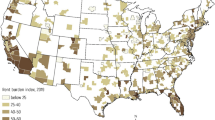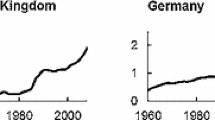Abstract
The paper concerns selected theoretical and empirical aspects of the decomposition of income inequality by spatially defined subgroups. Special consideration is given to the implications for measurement and comparison of regional inequality. The decomposition by the Theil coefficient is applied at global and European levels including estimates of historical development. Additionally, the empirical evidence on the decomposition of inequality in a number of countries is reviewed, regional inequality for 46 countries is estimated, and a simple method of cross-country classification according to relative importance of spatial dimension of inequality is provided.
Similar content being viewed by others
References
Akita T (2003) Decomposing regional income inequality in China and Indonesia using two-stage nested Theil decomposition method. Ann Reg Sci 37:55–77
Armstrong H (1995) Convergence among regions of the European Union 1950–1990. Pap Reg Sci 74:152–142
Bairoch P (1993) Economics and world history: myths and paradoxes. University of Chicago Press, Chicago
Balisacan A, Fuwa N (2003) Is spatial inequality increasing in the Philippines? WIDER conference on spatial inequality in Asia. Tokyo, pp 28–29
Berend IT (2003) Past convergence within Europe: core-periphery diversity in modern economic development. In: Tumpel-Guerell G, Mooslechner P (eds). Economic convergence and divergence in Europe. Edward Elgar, Cheltenham
Blažek J (1996) Meziregionální rozdíly v České republice v transformačním období. Sborníík ČGS 101:265–277
Bourguignon F (1979) Decomposable income inequality measures. Econometrica 47:901–920
Bourguignon F, Morrisson Ch (2002) Inequality among world citizens: 1820–1992. Am Econ Rev 92:727–744
Cornia G, Kiiski S (2001) Trends in income distribution in the post-world war II period. WIDER Discussion Paper 89
Cowell F (1980) On the structure of additive inequality measures. Rev Econ Stud 47:521–531
Deininger K, Squire L (1996) A new data set measuring income inequality. World Bank Econ Rev 10:565–591
Dostál P, Hampl M (2000) Globalisation: processes of integration or multi-polarisation. Acta Univ Carol Geogr XXXV:5–20
Elbers Ch, Lanjouw P, Mistiase J, Özler B, Simler K (2002) Are neighbours unequal? Estimating local inequality in three developing countries. WIDER-Cornell-LSE conference on spatial inequality and development. London, pp 28–30
Elbers Ch, Lanjouw JO, Lanjouw P, Leite P (2004) Inequality in Brazil: new estimates from combined PPV-PNAD data. Unpublished manuscript, World Bank
Felsenstein D, Portnov BA (2005) Understanding regional inequalities in small countries. Reg Stud 39:647–658
Firebaugh G (2003) The new geography of global income inequality. Harvard University Press, Cambridge
Forster M, Jesuit D, Smeeding T (2005): Regional poverty and income inequality in Central and Eastern Europe: evidence from the Luxembourg income study. In: Kanbur R, Venables AJ (eds) Spatial inequality and development. Oxford University Press, Oxford, pp 311–347
Galbraith J, Krytynskaia L, Wang Q (2004) The experience of rising inequality in Russia and China during the transition. Eur J Comp Econ 1:87–106
Gray D, Mills JA, Zandvakili MS (2004) An analysis of differential provincial income inequality trends in Canada. Res Econ Inequal 12:443–461
Hampl M (2000) Reality, society and geographical/environmental organization: searching for an integrated order. Charles University Faculty of Science, Prague
Kuznets S (1955) Economic growth and income inequality. Am Econ Rev 45:1–28
Loikkanen H, Riihelä M, Sullström R (2005) Regional income convergence and inequality in boom and bust, Results from microdata in Finland 1971–2000. In: Felsenstein D, Portnov B (eds). Regional disparities in small countries. Springer, Berlin
Maddison A (2003) The world economy: historical statistics. OECD Development Centre, Paris
Marshall AW, Olkin I (1979) Inequalities: theory of majorization and its applications. Academic, New York
Milanovic B (2002) True world income distribution, 1988 and 1993: first calculation based on household surveys alone. Econ J 112:51–92
Minot N, Baulch B, Epprecht M (2003) Poverty and inequality in Vietnam: spatial patterns and geographic determinants. IFPRI, Washington DC
Mishra P, Parikh A (1992) Household consumer expenditure inequalities in India: a decomposition analysis. Rev Inc Health 38:237–243
Morrisson Ch, Murtin F (2004) History and prospects of inequality among Europeans. European economic association and econometric society 2004 meetings. Madrid, pp 20–24
Motonishi T (2003) Why has income inequality in Thailand increased: an analysis using 1975–1998 surveys. Asian Development Bank, Manila
Novotný J (2004a) The socio-geographical differentiation of the world with a special attention to regional inequalities. Dissertation (in Czech), Charles University, Prague
Novotný J (2004b) Decomposition of global and European socio-economic inequalities with attention to their regional dimensions. Reg Sect Econ Stud 4:59–78
Parente P, d’Uva TB (2003) Evolução da pobreza e da desigualdade em Portugal no período 1995 a 1997. Rev Estud Demogr 34:73–93
Sala-i-Martin X (2002) The disturbing rise of global inequality. NBER Working Paper w8904
Schwarze J (1996) How income inequality changed in Germany following reunification: an empirical analysis using decomposable inequality measures. Rev Inc Wealth 42:1–11
Shorrocks A (1984) Inequality decomposition by population subgroups. Econometrica 52:1369–1386
Shorrocks A, Wan G (2005) Spatial decomposition of inequality. J Econ Geogr 5:59–81
Simler K, Nhate V (2005) Poverty, inequality, and geographic targeting. FCND discussion paper 192
Suarez-Villa L, Cuadrado-Roura JR (1993) Regional economic integration and the evolution of disparities. Pap Reg Sci 72:369–387
Tadjoeddin MZ (2003) Aspiration to inequality: regional disparity and centre-regional conflicts in Indonesia. WIDER conference on Spatial Inequality in Asia. Tokyo, pp 28–29
Theil H (1972) Statistical decomposition analysis. North Holland, Amsterdam
Williamson JG (1965) Regional inequality and the process of national development: a description of the patterns. Econ Dev Cult Chang 13:3–45
Author information
Authors and Affiliations
Corresponding author
Rights and permissions
About this article
Cite this article
Novotný, J. On the measurement of regional inequality: does spatial dimension of income inequality matter?. Ann Reg Sci 41, 563–580 (2007). https://doi.org/10.1007/s00168-007-0113-y
Received:
Accepted:
Published:
Issue Date:
DOI: https://doi.org/10.1007/s00168-007-0113-y




